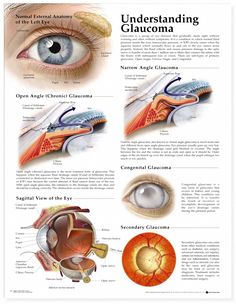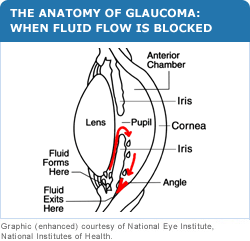
Acute glaucoma is a progressive disease resulting from the damage of the optic nerve. The eye produces aqueous humor that maintains the normal shape of the eye. This fluid exits the eye through the channels of the iris and cornea. When these channels are blocked, the pressure in the eye increases. This pressure eventually damages the optic nerve and results in blindness. In addition to the symptom of increased pressure, patients often experience other symptoms as well, including pain and loss of vision.
Open-angle glaucoma is the most common type of glaucoma and is caused by the buildup of aqueous humor, which flows throughout the eye and drains through the trabecular meshwork. Those who have this disease typically have elevated eye pressure. However, if this condition progresses to angle-closure glaucoma, the pressure in the eye can rise quickly and result in severe pain and vision loss.
The buildup of fluid, called aqueous humor, occurs in the front part of the eye. The aqueous humor is made behind the iris, and it exits the eye through channels in the iris and cornea, called the trabecular meshwork. In some cases, this fluid is obstructed, causing high pressure in the eye. In both types of glaucoma, the elevated pressure can eventually damage the optic nerve, which results in blindness.
Open-angle glaucoma is the most common type of acute glaucoma. This type of glaucoma is characterized by an angle closure, which occurs when the iris and cornea are too narrow. In closed-angle angiography, the drainage canals in the eye are blocked, resulting in an acute elevation of the eye’s pressure. If this is the case, the condition is life-threatening, and medical treatment is required immediately.
Often, the symptoms of glaucoma are not related to a specific cause. Some people are predisposed to developing this condition due to an eye disorder, while others have no symptoms at all. There are many different types of glaucoma, so it is important to understand what causes your condition. Your doctor may recommend a prescription from a reputable ophthalmologist or optometrist to determine your exact risk.

Acute glaucoma is caused by a narrow drainage angle between the cornea and iris. This blockage may lead to increased pressure in the eye. While a person with this condition can maintain their sight, it is important to follow their treatment plan. The goal is to lower the pressure in the eye, which can improve their quality of life. There are various causes of acute glaucoma, but the most common cause is a blocked angle.
Other glaucoma causes include an elevated intraocular pressure (IOP). This is caused by an inability of the eye to drain fluid properly. In the front part of the eye, clear fluid, called aqueous humor, circulates inside. The aqueous drainage angle is located on the retina, which is a complex network of cells. When this drainage angle is blocked, the fluid pressure builds up, and eventually can damage the optic nerve.
In children, the most common glaucoma symptom is cloudy cornea. The disease can affect either one or both eyes. In children, the symptoms of acute glaucoma may be similar to those of other medical conditions. To identify the glaucoma causes, it is important to get a thorough examination. Listed below are some of the most common types of glaucoma. They include:
Typically, aqueous humor forms behind the iris and is expelled from the eye through channels in the iris and cornea. In watery glaucoma, obstruction of this fluid can lead to increased intraocular pressure. The pressure can affect the optic nerve, leading to severe vision loss. The health website https://www.culturademocratica.org/ reminds you that it is important to keep an eye on aqueous humor levels to avoid an emergency.
There are several causes of glaucoma, but some cases of acute glaucoma are considered a medical emergency and require immediate medical attention. In addition to the underlying cause, glaucoma is exacerbated by a number of factors. Among these factors is increased intraocular pressure. This increased pressure can cause permanent damage to the optic nerve. The best treatment for glaucoma includes lifestyle changes, diet, and medication.